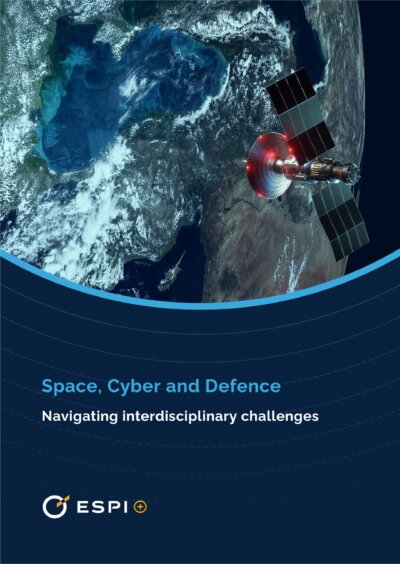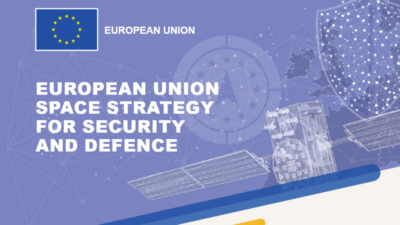ESPI Executive Brief No. 57
1. A crisis with a significant impact on the European space sector
The war in Ukraine, which started in February 2022, recalls once more the unique value and critical importance of space applications for security and defence purposes, from gathering intelligence and monitoring the situation to ensuring the availability of communication means. The recent cyberattack against a commercial satellite from the U.S. company ViaSat, which had repercussions for military actors in Ukraine, damaged the terminals of civilian customers across Europe and affected thousands of wind turbines in Germany, also put under the spotlight the rising challenges to ensure the protection of the space infrastructure.
The conflict also represents a unique upheaval for the international and European space sector, due to the sanctions and embargos that resulted in a major breakup of the close relations built by Western space stakeholders with their Russian counterparts over the past decades. The war already has major impacts and consequences for the European space sector, including:
- The cancellation of Soyuz launches from the Guiana Space Centre by Roscosmos, impacting institutional satellites’ launches, and its refusal to launch some European commercial satellites.
- The delay of the ExoMars rover mission (probably until 2026 or later), initially scheduled to launch in September this year. The situation compels ESA to find an alternative launcher, which led the Agency to start a fast-track industrial study to define the available options to implement the mission. ESA also decided to stop collaboration on upcoming Russian lunar missions.
- The effect on European launchers: as Vega and Vega-C use Ukrainian-built engines, the disruption of Ukrainian factories (e.g. Yuzhmash) and the limited stockpiling of Vega engines may affect the production and future launch rate of both rockets
Beyond immediate impacts on space programmes, major implications for the space sector at large can be expected on the long-term, in particular as a consequence of the deterioration of international relations that will affect future cooperation, international trade as well as multilateral negotiations on major space issues such as arms control in space or Space Traffic Management.
2. A crisis that provides a new push for European efforts on autonomy and security
Following the start of the conflict, ties between space stakeholders in Russia and Europe were cut, with uncertain long-term impacts. The war pushed at the forefront of the policy agenda the strategic challenges that Europe needs to urgently address and will probably contribute to accelerate ongoing efforts.
First, the situation highlights the vulnerabilities caused by Europe’s reliance on Russia. Originally thought to be a win-win relationship based on mutual reliance, the latest developments actually revealed a lopsided dependence. Beyond raw materials, the space sector proved to be one of the few industrial areas where Europe directly depends on Russian capabilities, an advantage that the country leveraged to retaliate against European sanctions. The situation illustrates the limits of European strategic autonomy and puts pressure on Europe to quickly take appropriate measures. The domain of access to space is particularly concerning, with serious issues resulting from the abrupt end of Soyuz in Kourou and the reliance of European launcher programmes on Russian parts and components. This dependence on Russia translates in difficulties to timely deliver to orbit even the most sensitive satellites, which represents an operational and symbolic blow to Europe. Indeed, the withdrawal of the Soyuz launcher from Kourou has already resulted in the grounding of five institutional satellites, including two Galileo spacecraft as well as a French military satellite, which all have security and defence applications.
Besides, the situation also shows the need to enhance European security and defence and is expected to further catalyse and speed up ongoing efforts in this domain, which will be further strengthened following the adoption of the Strategic Compass in March. The document, which sets the scene for future EU action in security and defence, contains sections dedicated to space and emphasises Europe’s current efforts as well as the need to further them, including through the development of new capabilities and technologies. Beyond these long-prepared advancements, statements about the necessity to further integrate space with security and defence were also included in the Declaration adopted by European leaders during their meeting on the conflict in Ukraine hold in Versailles in March.
This landscape raises major questions and expectations. First, the security and defence dimension of the EU Space Programme will likely be reinforced in the coming months, in line with the intent expressed in the European Commission’s communication on its contribution to European defence released in February. For instance, voices have already been raised to improve the military use of Copernicus, including through the creation of a dedicated service comparable to Galileo PRS. Similarly, the proposed EU Secure Connectivity Initiative is planned to be used, inter alia, for surveillance, crisis management as well as for connection and protection of critical infrastructure. Second, the reaction of Europe in case of an attack against one of its satellites as well as the nature of operators that could benefit from such measures are still unknown. A final issue to tackle is the improvement of resilience, as cyberattacks on satellites and (critical) infrastructure have revealed Europe’s weaknesses in this domain.
In this context, the European Space Security and Defence Strategy announced in the Strategic Compass and to be published in 2023 will be an essential step for the EU and its Member States to express their stance on these issues and lay down a concrete action plan. In particular, governance should be a core focus: the Strategy should clarify the processes and responsibilities to be applied to ensure the protection and resilience of European space assets in times of crisis. Indeed, the intermingling between national and EU levels creates confusion and inefficiencies that will need to be sorted out. Although the Commission plans to enlarge the current Galileo threat response mechanism to the systems and services that fall under other components of the EU Space Programme, this intention still has to be confirmed by Member States. In parallel, ongoing security-related efforts of ESA will also have to fit into this new landscape and complement initiatives taken at national and EU levels.
3. A crisis that forces Europe to think politically about space
So far, European efforts in space have been mostly focused on civilian and commercial activities, with strong emphasis on international trade and cooperation. Accordingly, Europeans have kept space affairs rather isolated from geopolitical developments, prioritising the progress and benefits associated with policy and programme collaboration. The current situation abruptly contrasts with this approach.
Overall, a convergence of unrelated factors challenge some historical positions of Europe in space: from the advent of the “New Space” economy and its consequences on space business, to the current crisis which marks yet another milestone urging European stakeholders to reconsider the way they “think” and “do” space internationally. As a matter of fact, European decision-makers have demonstrated their readiness to use space as a geopolitical tool, that is, space is considered as a domain like the others. Consequently, interdependencies in the space sector can be used by states to exert pressure and push forward their own strategic interests. This way of thinking, which has been embedded into most of other space powers’ mindsets for years, is still not mainstream in Europe. However, such developments might heavily weigh in to shape the future of European international cooperation in space, in particular regarding the nature and modalities of its eventual reliance on non-European sources of supply in an increasingly uncertain space environment.




